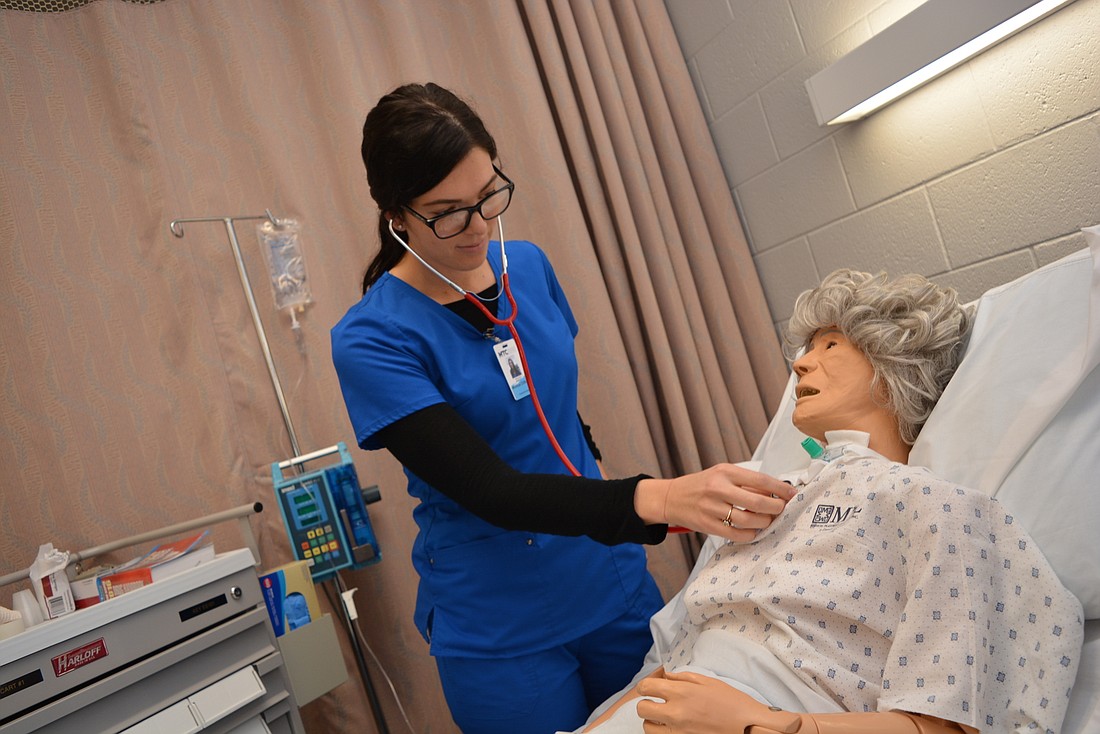- May 7, 2025
-
-
Loading

Loading

Five years ago, Cindy Coffman, vice president of human resources at Tidewell Hospice, had heard about the national and statewide shortage of registered nurses.
Still, Tidewell seemed unaffected — until 18 months ago. Coffman discovered firsthand what had been a national trend.
“None of us can fill the job openings,” Coffman said. “The applicant volume isn’t there. We’re really feeling it at this point.”
For the period 2017-2025, the statewide projected job openings for registered nurses is 113,795. In Manatee and Sarasota counties, there are 3,878 projected job openings during the same period, according to the Florida Department of Economic Opportunity. The FDEO lists a shortage of 485 registered nurses for 2018-2019 in the Sarasota-Manatee area.
Tidewell itself has 12 full-time and five as-needed positions open for registered nurses, as well as seven licensed practical nursing positions open across its service areas in Sarasota, Manatee and Charlotte counties. Coffman said some positions have been open for more than four months without a single application. Others receive a handful of applications, which must be vetted.
Coffman said more registered nurses are needed.
That’s where Manatee Technical College wants to come in. It currently only offers a licensed practical nursing program. But with the support of the Florida Association for Career and Technical Education, MTC is lobbying state legislators to allow technical colleges and centers like itself to offer “certain” associate degrees in nursing.
Language in the proposed legislation is vague, but MTC officials say they would be able to offer a transition program, where students who complete the licensed practical nursing program can continue through a program that would lead to a registered nursing license. Technical schools currently cannot offer registered nursing programs.
State Rep. Bill Robinson filed House Bill 381 to that effect Jan. 21. As of Jan. 30, it was in the Florida House of Representative’s Higher
Education and Career Readiness Subcommittee. If the bill makes it into law, it would take effect July 1.
“We’re not trying to compete with the state college,” MTC spokeswoman Maura Howl said. “We’re trying to offer our graduates an opportunity they currently don’t have. It’s all about career pathways — to give students stepping stones to progress.”
MTC educates about 84 licensed practical nursing students each year, and of those, about 75% of MTC’s LPN graduates go to the private Galen College of Nursing in St. Petersburg to further their education and become registered nurses, Barrase said.
Locally, Keiser University also has several nursing program options, but none that specifically trains existing LPNs to become registered nurses, said Michele Morgan, campus president for Keiser’s Lakewood Ranch location. The school focuses on bachelor’s degrees in nursing and graduates about 150 nursing students annually.
State College of Florida offers associate and bachelor degrees in nursing. The associate degree is what allows students to test for their registered nursing license. SCF has a “bridge” program like MTC wants to offer and takes 60 students annually, SCF President Carol Probstfeld said.
She said 81% of students who apply to SCF for the transition program are accepted. The need for LPNs, patient care technicians and medical assistants outweighs the need for registered nurses, she said.
“Those are pipelines to the RN and BSN programs,” Prosbstfeld said. “We need (technical schools) to fill that niche they currently have. They’re the feeder. The State College of Florida and our sister schools have the track record and the know-how to respond to the nursing shortage.”
She said if the Legislature fills the college and university funding requests of $212 million statewide, colleges like SCF would have the funding they need to hire more nursing instructors and double the number of nurses trained from 4,000 to 8,000 statewide.
Students like Mill Creek 23-year-old Monica Clifford say they would like other options. Clifford was not accepted into SCF’s nursing program and is enrolled in MTC’s licensed practical nursing program. She chose to get her LPN so she could get into the field of nursing. She already is exploring options to earn her RN license and said her options are limited.
“I’ve always wanted to be a nurse,” said Clifford, a 2014 graduate of Lakewood Ranch High School. “I’ve been looking at options. It’s stressful for us. (With SCF) you have all your eggs in one basket and there’s one time a year to apply. We want to keep going. We don’t want to wait. This would give us options. If MTC had a program, a lot of people would want to continue.”
Coffman said she likes MTC’s proposal because it will help fill the local need for nurses and provide more options for students like herself.
Over the past year at Tidewell Hospice, the organization has launched a social media campaign to promote its vacant nursing positions, hired a nurse recruiter and even increased signing and referral bonuses, among other measures.
“We’ve had to really up our game,” Tidewell’s Chief Human Resources Officer Julie Schilson said. “We do what we can to draw attention to it.”
Schilson said Tidewell employees 257 registered nurses and 61 licensed practical nurses to serve about 1,050 patients daily. Patient counts currently are up to 1,100 daily and will increase more as more seasonal residents come to the area.
Lakewood Ranch Medical Center’s Chief Nursing Officer Judy Young said the hospital has about 205 full-time and as-needed nurses on staff with few positions open because the hospital is proactive in recruiting nurses. It partners with the local nursing schools by offering clinical rotations and then recruiting standout students who fit well with the hospital’s culture. It also offers a 12-week residency program, through which new hires work with a partner as they learn the hospital setting.
“We’ve taken these creative steps to really embrace existing and potential new RNs coming into our program,” Lakewood Ranch Medical Center’s Director of Marketing Lisa Kirkland said. “We’re trying to stay one step ahead of the nursing shortage issue.”